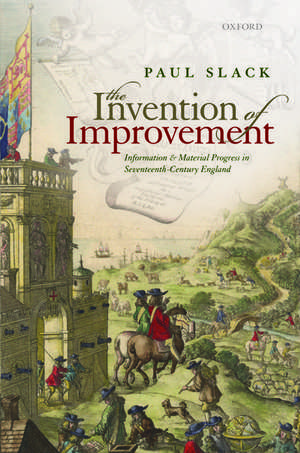The Invention of Improvement: Information and Material Progress in Seventeenth-Century England
Autor Paul Slacken Limba Engleză Hardback – 6 noi 2014
Preț: 397.95 lei
Preț vechi: 449.25 lei
-11% Nou
Puncte Express: 597
Preț estimativ în valută:
76.16€ • 79.22$ • 62.87£
76.16€ • 79.22$ • 62.87£
Carte tipărită la comandă
Livrare economică 03-09 aprilie
Preluare comenzi: 021 569.72.76
Specificații
ISBN-13: 9780199645916
ISBN-10: 0199645914
Pagini: 336
Ilustrații: 5 black and white figures/illustrations
Dimensiuni: 163 x 240 x 27 mm
Greutate: 0.65 kg
Editura: OUP OXFORD
Colecția OUP Oxford
Locul publicării:Oxford, United Kingdom
ISBN-10: 0199645914
Pagini: 336
Ilustrații: 5 black and white figures/illustrations
Dimensiuni: 163 x 240 x 27 mm
Greutate: 0.65 kg
Editura: OUP OXFORD
Colecția OUP Oxford
Locul publicării:Oxford, United Kingdom
Recenzii
The Invention of Improvement combines sophisticated synthesis of recent scholarship with extensive research on the printed literature of the period. It deftly weaves together macro-analysis of England's changing fortunes with illuminating vignettes of the activities of particular visionaries and the texts that enshrined their ambitions.
This is a mature work of scholarship which describes and analyses the development of economic theory in the early modern period and its impact on economic and social policy in the time of Pepys. Thought provoking and readable, it raises fundamental issues of economic policy which are still relevant today.
The historical sweep of this book is in fact vast, from the Reformation of the Sixteenth Century through to the Enlightenment of the 1700s and beyond. Its subject encompasses the entire socio-economic development of that period. It is therefore a challenging book but also a very rewarding one.
This book extends the chronological breadth and analytical depth of this research agenda and employs a novel analytical framework for interpreting it: the culture of improvement.
Its conceptualization and massively detailed content deserve the highest praise ... Slack's magnum opus crowns a career in the field of early modern economic history of quite exceptional achievement.
this book offers the most detailed examination to date of the development of this concept in English print culture from c.1570 to c.1730 ... Slack's argument is informed by years of painstaking research and extraordinarily wide reading.
This is a mature work of scholarship which describes and analyses the development of economic theory in the early modern period and its impact on economic and social policy in the time of Pepys. Thought provoking and readable, it raises fundamental issues of economic policy which are still relevant today.
The historical sweep of this book is in fact vast, from the Reformation of the Sixteenth Century through to the Enlightenment of the 1700s and beyond. Its subject encompasses the entire socio-economic development of that period. It is therefore a challenging book but also a very rewarding one.
This book extends the chronological breadth and analytical depth of this research agenda and employs a novel analytical framework for interpreting it: the culture of improvement.
Its conceptualization and massively detailed content deserve the highest praise ... Slack's magnum opus crowns a career in the field of early modern economic history of quite exceptional achievement.
this book offers the most detailed examination to date of the development of this concept in English print culture from c.1570 to c.1730 ... Slack's argument is informed by years of painstaking research and extraordinarily wide reading.
Notă biografică
Paul Slack is Emeritus Professor of Early Modern Social History at Oxford University. He is the author of The Impact of Plague in Tudor and Stuart England (1990), From Reformation to Improvement: Public welfare in early modern England (1999) and books on urban history and poverty in the sixteenth and seventeenth centuries. He has been editor of the journal Past and Present, is a Fellow of the British Academy, and was Principal of Linacre College, Oxford, until 2010.












